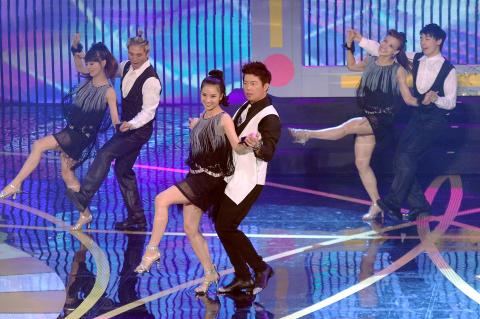The 47th Golden Bell Awards — Taiwan’s version of the Emmys — opened yesterday evening at the Sun Yat-sen Memorial Hall with a star-studded red-carpet walk that drew a large crowd of fans.
As of press time, the awards winners announced included Cheng Chi-liang (鄭志良), Chiang Yi-ting (江依庭) and Chen Hsiao-tung (陳曉東) for the Best Film Editing Award for their work in Dear Mother Earth (跟著賴和去壯遊) and Lee Wei-chieh (李偉傑) winning the Best Photography Award for his work in The Oriental Honey Buzzards of Ninety Nine Peaks.
The Educational and Culture Award was given to Last Island — Defense of Taiwan 1950-1955 (最後島嶼 — 台灣防衛戰 1950-1955), part of the Movement over a Century series.

Photo: Taipei Times
Best Mini-series TV/Movies Director Award was given to Chen Yu-chieh (陳鈺傑), director of The Thief (小偷) and Best Mini Series Scriptwriter Award was given to Tsai Yi-fen (蔡怡芬) and Chu Chia-lin (朱家麟) for The Princess and the Prince (公主與王子).
Lai Hsiao-yi (賴曉誼) received Best Female Support Actor Award for her role in You Can Do It, Dad! (爸爸,加油!) while Hsi Hsiang (喜翔) received the Best Male Supporting Actor Award for his role in the Old Street Rhapsody (老街狂想曲).
Best Mini-series TV/Movies Actor Award was given to Chen Chu-sheng (陳竹昇) for My Little Honey Moon (野蓮香) while Best Female Actor Award was won by Jade Chou (周幼婷) for her role in The Happy Life of Debbie (黛比的幸福生活).

Photo: Taipei Times
The late Fu Pei-mei (傅培梅), who in 1962 became the first person to host a cooking show in Taiwan, and remembered for her many delicious dishes taught on air and a subsequent series of cookbooks, was posthumously awarded the Golden Bells Special Award.
Fu’s daughter, Cheng An-chi (程安琪), said the posthumous award left “mother without any regrets,”adding that Fu had mentioned her only regret in life was her application for the Special Award had been rejected the year she had applied.
Chang Mei-yao (張美瑤), most known for her successful return to the film industry after a three-decade break, was also given a posthumous Golden Bell Special Award. Chang was best known for her role in Bangkok No Yoru (曼谷之夜) in 1966 and White Rose of Hong Kong (香港白玫瑰) in 1967.
Although there was no award for veteran entertainer Tao Da-wei (陶大偉), who passed away last month, his contribution to the industry was noted with a one-minute-long video montage.
Timothy Chao (曹啟泰) — an old acquaintance of Tao’s — introduced the clip, which showed how Tao, through the vicissitudes of life, always kept smiling. As the clip ended, Chao was overcome with emotion and asked everyone to rise in silent tribute to Tao.

A preclearance service to facilitate entry for people traveling to select airports in Japan would be available from Thursday next week to Feb. 25 at Taiwan Taoyuan International Airport, Taoyuan International Airport Corp (TIAC) said on Tuesday. The service was first made available to Taiwanese travelers throughout the winter vacation of 2024 and during the Lunar New Year holiday. In addition to flights to the Japanese cities of Hakodate, Asahikawa, Akita, Sendai, Niigata, Okayama, Takamatsu, Kumamoto and Kagoshima, the service would be available to travelers to Kobe and Oita. The service can be accessed by passengers of 15 flight routes operated by

MORE FALL: An investigation into one of Xi’s key cronies, part of a broader ‘anti-corruption’ drive, indicates that he might have a deep distrust in the military, an expert said China’s latest military purge underscores systemic risks in its shift from collective leadership to sole rule under Chinese President Xi Jinping (習近平), and could disrupt its chain of command and military capabilities, a national security official said yesterday. If decisionmaking within the Chinese Communist Party has become “irrational” under one-man rule, the Taiwan Strait and the regional situation must be approached with extreme caution, given unforeseen risks, they added. The anonymous official made the remarks as China’s Central Military Commission Vice Chairman Zhang Youxia (張又俠) and Joint Staff Department Chief of Staff Liu Zhenli (劉振立) were reportedly being investigated for suspected “serious

ENHANCING EFFICIENCY: The apron can accommodate 16 airplanes overnight at Taoyuan airport while work on the third runway continues, the transport minister said A new temporary overnight parking apron at Taiwan Taoyuan International Airport is to start operating on Friday next week to boost operational efficiency while the third runway is being constructed, the Ministry of Transportation and Communications said yesterday. The apron — one of the crucial projects in the construction of the third runway — can accommodate 16 aircraft overnight at the nation’s largest international airport, Minister of Transportation and Communications Chen Shih-kai (陳世凱) told reporters while inspecting the new facility yesterday morning. Aside from providing the airport operator with greater flexibility in aircraft parking during the third runway construction,

Taiwanese and US defense groups are collaborating to introduce deployable, semi-autonomous manufacturing systems for drones and components in a boost to the nation’s supply chain resilience. Taiwan’s G-Tech Optroelectronics Corp subsidiary GTOC and the US’ Aerkomm Inc on Friday announced an agreement with fellow US-based Firestorm Lab to adopt the latter’s xCell, a technology featuring 3D printers fitted in 6.1m container units. The systems enable aerial platforms and parts to be produced in high volumes from dispersed nodes capable of rapid redeployment, to minimize the risk of enemy strikes and to meet field requirements, they said. Firestorm chief technology officer Ian Muceus said